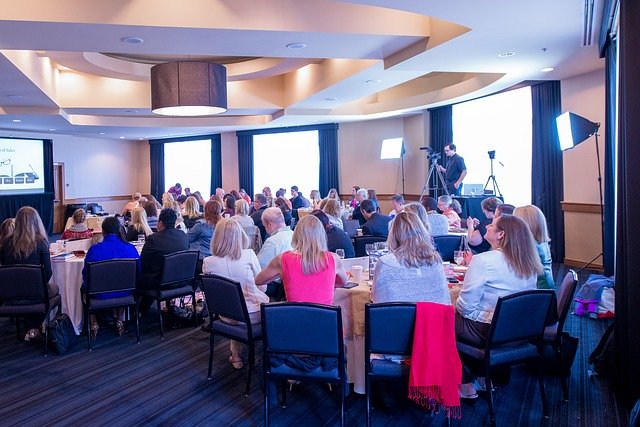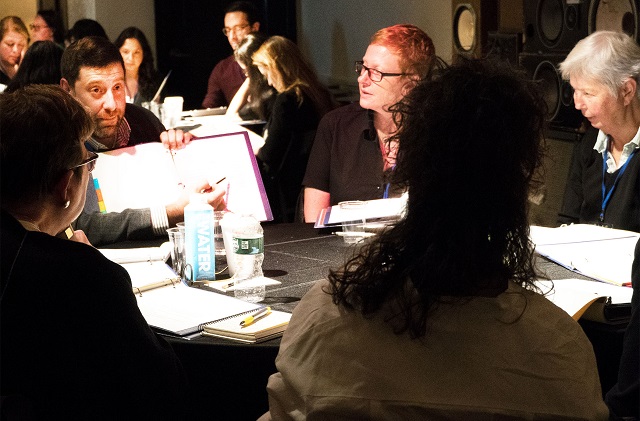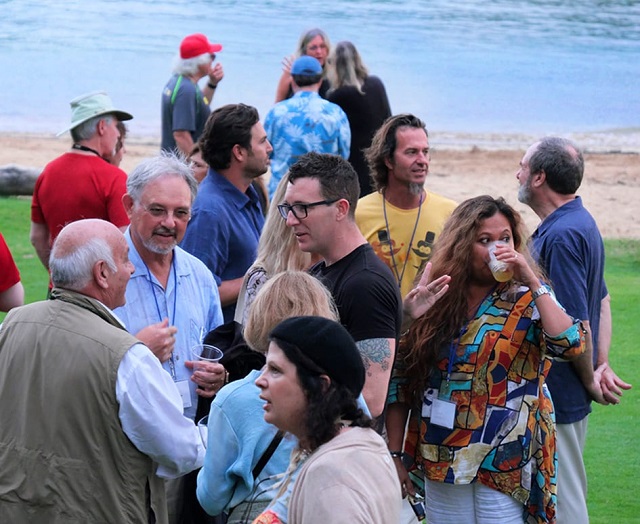
Conferences provide a focused environment for learning and networking with fellow writers, agents, publishers, and other industry professionals. While writing conferences vary in length, format, and focus, most include three basic types of events on their schedules:
- Workshops
- Panel discussions
- Pitch sessions
Some conferences also incorporate book fairs, author talks and signings, and addresses by keynote or featured speakers.
Among your considerations when choosing a conference to attend are what topics will be covered; who the speakers, presenters, instructors, and guests will be; the location; and of course, cost—but most importantly, consider your purpose for attending the conference in the first place.
Questions to Ask Yourself
Answering these questions can help you ensure you find the right conference to meet your needs.
Do you have a finished manuscript to pitch?
After a day of panels and presentations, the second day of The Gotham Writers Conference, held in New York City, features a pitching roundtable. Small groups of pre-selected authors spend a day with two agents at their table. The agents and authors are matched by genre to get the most out of the readings, discussions, and pitches.

The Writer’s Digest Conference features a Pitch Slam, a fast-paced event that allows writers to make a series of one-on-one 3-minute pitches over a 60-minute period to a roomful of agents and editors. The Slam is just one happening among the conference’s full roster of speakers and workshops.
The New York Pitch Conference is by application only and is small—usually 45 to 65 participants—compared to most conferences. Organizers say this is not a conference for writers who are seeking praise, looking to expand their craft knowledge, or expect the typical conference experience. If you want to learn more about the industry from insiders, need to determine if you’re on the right track with your novel, or have a finished or near-finished manuscript, this conference might be right for you.
Do you want to immerse yourself in a specific genre or form?
Western Writers of America, which promotes the literature of the American West, hosts the annual WWA Convention. Writers of traditional Western fiction, historians and other non-fiction authors, young adult and romance writers, and writers interested in regional history are invited to learn, teach, renew friendships, and make new connections at this event.
Fantasy, science fiction, and horror writers can spend six weeks meeting and interacting with top authors, agents, and editors at the Odyssey Writing Workshop, held at Saint Anselm College in Manchester, New Hampshire. Not a traditional conference, this program is run and taught by a former senior editor at Bantam Doubleday Dell and features different guest lecturers each week.
Sleuthfest, organized by the Florida chapter of the Mystery Writers Association, offers a range of activities including panels, workshops, a raffle, manuscript critiques, a reader’s corner, and an author auction. The event also offers strategy and pitch appointments (if you don’t know the difference, see their FAQ page), including the Flamingo Pitch Tank, during which authors have three minutes to pitch their book to all the agents and editors in attendance at one time.
Writers of mystery, crime, and thrillers have no shortage of conferences to choose from, including Killer Nashville,Thrillerfest, and The California Crime Writers Conference.
If you’re a poet, the Poetry Workshop by the Community of Writers at Squaw Valley offers a week of workshops and readings, and the opportunity to work individually with a staff poet. For more than 50 years, the Community of Writers has been holding workshops for prose and poetry writers at the foot of the Squaw Valley ski slopes.

The RWA Conference website describes the primary goal of the Romance Writers of America as the advancement of “the professional interests of career-focused romance writers through networking and advocacy,” and while the conference is developed with that goal in mind, it also offers workshops geared to writers at every stage of their career.
The Society of Children’s Book Writers and Illustrators holds two conferences annually. The summer conference in Los Angeles spans three days with an optional craft-focused fourth day. The two-day winter conference in New York City offers craft-oriented masterclasses, as well as keynote addresses and panels with agents and editors.
Are you a new writer?
The Bread Loaf Writers’ Conference, founded by Robert Frost and a group of other writers in 1926, is by application and accepts 250 emerging writers. Attendees work closely with a notable and award-winning faculty for 10 days. Small-group workshops are in fiction, poetry, and non-fiction. Attendees have the opportunity to visit with editors, literary agents, and publishers in groups and individually.
Though not exclusively for new writers, the Sewanee Writers’ Conference provides a welcoming environment for writers just starting out. In addition to workshops, each participant gets an individual meeting with a faculty member and has the opportunity to meet and learn from visiting editors and agents, as well as theatre professionals.
Do you want to meet as many writing-industry professionals in one place as you can?
The San Francisco Writers Conference is dubbed “a celebration of craft, commerce and community,” and has one of the largest faculties of any writers’ conference. With over 100 presenters and more than 80 sessions, this conference is a networking opportunity to meet industry professionals and fellow writers who can help you get published.
The Association of Writers and Writing Programs’ annual conference is one of the biggest of the year, hosting 12,000 participants, featuring 2,000 presenters and 550 readings, lectures, and panels. More than 800 presses, journals, and literary organizations participate in the accompanying book fair. Typically held in March or April, the location varies.
Do you want to escape to a beautiful or exotic location to write?
Screenwriters and writers of poetry, fiction, non-fiction, and memoir gather on the island of Kauai to learn from bestselling authors at the Kauai Writers Conference. In addition to learning from big-name authors who lead masterclasses, attendees get to mingle with faculty and can meet literary agents in pitch and critique sessions.

At the North Words Writers Symposium, in Skagway, Alaska, not only is the focus on the craft of writing and publishing, participants also get to experience “networking with human beings”—the founders emphasize discussion over lecture—and “frontier adventures,” such as train rides, hikes, and rafting trips. If you love the outdoors as much as you do writing, this event might be for you.
The Santa Barbara Writers Conference is a week-long intensive held beachside. For six days, writers can select from more than 30 workshops and panels. Every registered attendee receives a manuscript consultation from a writing teacher or editor. In addition, the event includes an opening night banquet, five evening keynotes, book signings, a poolside reception, and an awards banquet.
Would you like to meet and learn from the authors you read?
The Amelia Island Book Festival promotes both the joy of reading and the craft of writing through a series of events held annually in February. New York Times best-selling authors, independent publishers, awards programs, and workshops are all part of this event, which attracts thousands of adults and young people. The festival provides the opportunity to both learn from and be entertained by some of today’s most prominent authors.
The San Miguel Writers’ Conference and Literary Festival is an international gathering of cross-cultural, multilingual authors, industry experts, and readers. In addition to workshops and master classes for writers, eight main-stage ballrooms with 10,000+ seating capacity feature keynotes, panels, and seminars that are open to the public.
Do you need support as a freelancer and/or want to learn the business aspects of writing?
Agent pitch sessions, clinics on writing query letters, and other offerings at the Literary Writers Conference. New York City are intended to help writers “maneuver in the marketplace” as professionals. This is a two-day event hosted by the Community of Literary Magazines and Presses, which supports independent literary publishers including magazines, e-zines, small presses, chapbook publishers, and internet publishers.
If you’re building a career as an independent writer, the American Society of Journalists and Authors (ASJA) Conference is aimed to support freelance journalists and non-fiction writers. Held in New York City, typically in the late spring, the ASJA also hosts regional conferences in major cities in the summer and fall.
Author John Matthew Fox of Bookfox believes that, at some point, every writer should attend a business conference for entrepreneurs instead of a writing conference. If your writing is more than a hobby, consider any one of 13 upcoming conferences suggested by Entrepreneur magazine.
Picking the Right One
Any conference, when matched with your writing goals, can:
- Expose you to knowledge from industry experts
- Provide learning opportunities that can further develop your craft
- Give a boost to your confidence
- Help you build your network in the larger writing community
The pros and cons of writing conferences (as well as workshops and retreats) and a list of questions to ask that will help you find the right event for you are outlined in my recent article How to Choose the Right Writing Event. Before committing your time and resources, check out that article too and apply the questions you’ll find there to help you make the best decision about which conference you should attend.

